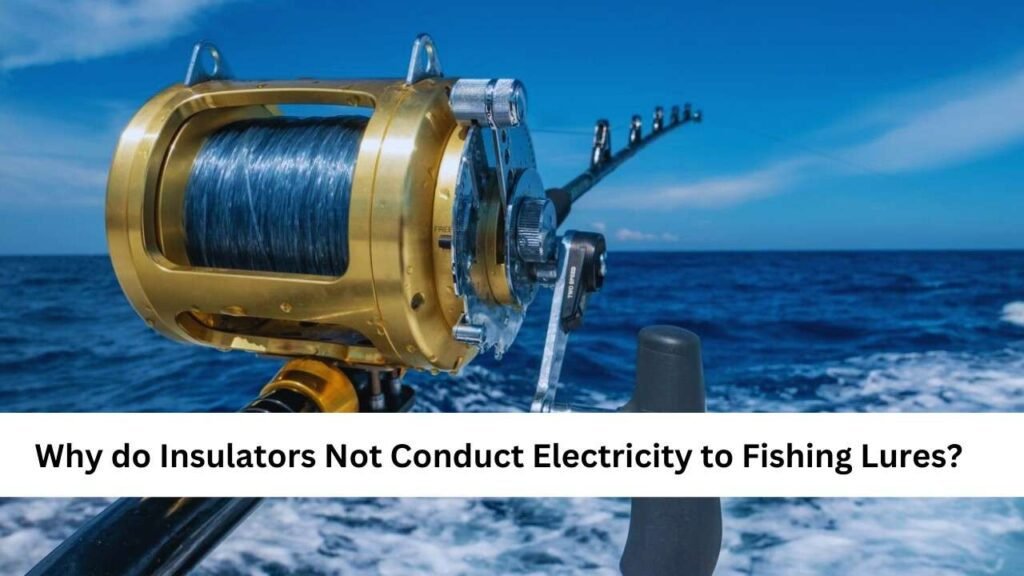Insulators are materials that resist the flow of electricity. This is important when we think about fishing lures. Many fishing lures are made with insulators, which helps keep the electricity in the water from affecting the lure. When a lure is used, it must attract fish without interference from electric currents. Insulators protect the lure and help it function better in the water. This means that anglers can fish without worrying about unwanted electrical problems. Understanding why do insulators not conduct electricity to fishing lures helps us appreciate how fishing lures work, making them safer and more effective for catching fish. Ultimately, using insulators in lures solves the problem of electrical interference, ensuring a successful fishing experience.
What are Insulators and How Do They Work?
Insulators are materials that stop electric currents from flowing, keeping electricity from passing through them. This happens mainly because of their atomic structure, which prevents free electrons from moving easily. Insulators work like walls that block electrical energy from moving, making them important for many uses, including how fishing lures are made and work.
- Plastics: Widely used in fishing lures, plastics are favored for their lightweight and durable nature. They can be molded into various shapes and colors, making them versatile for different fishing conditions.
- Rubber: This material offers flexibility and resilience. Rubber lures can mimic the movement of live bait and are effective in various water conditions.
- Specially Treated Metals: Certain metals are treated or coated to improve their insulating properties. These treatments enhance the metal’s resistance to corrosion and wear, ensuring the lure maintains performance over time.
- Coatings: Various coatings can be applied to lures made of different materials to further enhance their durability and effectiveness in water, providing added protection against environmental factors.
How It Works
Insulators are very important for stopping electricity from moving in fishing lures. When you use a lure in the water with electric currents, the insulator protects it from any unwanted electric signals. By keeping electricity away, these materials help the lure attract fish without any problems from nearby electric activity. This makes the lure work better and improves the overall fishing experience by lowering the chances of electrical issues.
5 Reasons Why Insulators Do Not Conduct Electricity in Fishing Lures
Reason 1 – Atomic Structure
Insulators have an atomic makeup that doesn’t have free electrons, which are needed to conduct electricity. Since they don’t have charge carriers, insulators stop electric current from flowing. This makes them great for some uses, like fishing lures. In waters with electricity, this feature is important because it helps keep the lures working well, allowing anglers to fish without problems from electric currents.
Reason 2 – High Resistance
Insulators are known for having high electrical resistance, which creates a barrier that makes it hard for electric currents to pass through. This high resistance is helpful when fishing because it stops any electrical signals in the water from messing up how the lures work. So, anglers can have a better fishing experience without distractions from unwanted electrical noise.
Reason 3 – Stopping Rust
One great thing about using insulators in fishing lures is that they help stop rust and corrosion. Many insulators cover metal parts with a protective layer, keeping them safe from water and electricity that can cause damage. By protecting these parts, insulators help fishing lures last longer and work well, which is important for successful fishing trips in different places.
Reason 4 – Electric Field Disruption
Insulators are important for blocking electric fields that might be in the water. By stopping outside electric influences, these materials make sure that the lures can work without interference. This means the lures can attract fish effectively since they won’t be confused by outside electric fields, which increases the chances of the angler catching something.
Reason 5 – Non-conductive Coatings
Many fishing lures have extra non-conductive coatings that make them better at insulating. These coatings act as another barrier against electric currents to protect the lure. By improving the lure’s ability to insulate, these coatings help the lures work their best, no matter where you are fishing, making the whole fishing experience more enjoyable and effective.
5 Best Ways to Fix the Problem of Electrical Interference in Fishing Lures
- Pick Better Insulators: Choosing fishing lures made from good insulating materials can help reduce electrical problems. Look for lures made from strong plastics or specially treated metals to ensure they work well in waters with electricity.
- Check and Care for Coatings: Regularly check the coatings on your lures for any damage. Apply new coatings when needed to keep them from conducting electricity. This simple step can help your lures last longer.
- Avoid Mixing Positive and Negative Currents: When fishing in areas with electric currents, be careful where you place your lure so it doesn’t mix with strong currents. Learning about the water’s electric field can help you find the best spots to fish and lower the risk of electrical issues.
- Use Electric Field Finders: Getting small, easy-to-carry electric field detectors can help you know how much electrical interference is in the water. If you know where the currents are strongest, you can change how you fish and pick lures that cause less trouble.
- Try Different Lure Shapes and Sizes: The shape and size of a lure can affect how much it is influenced by electricity. Trying different designs might show you which ones work best in different situations. Anglers can learn a lot by testing various types to see what attracts fish without electric signals getting in the way.
Read Previous – Similar koi fish sedate Canada
Why Insulators Cannot Be Charged by Conduction
Insulators are materials that stop electric charges from moving, which is why they can’t be charged by conduction. When a charged object touches an insulator, there are no free electrons, so there are no charge carriers to help move electrons. Because of this, the charge doesn’t go through the insulator; it stays on the surface of the object.
This feature makes insulators good at preventing electrical discharge, keeping an electric charge without letting it flow away. So, in situations like using fishing lures in electrically charged waters, insulators help keep the charge from moving to the lure, making sure it works well and safely.
Why Do Insulators Resist Electricity?
Insulators stop electricity from flowing mainly because of how their atoms are arranged and the lack of free electrons. Unlike conductors, where electrons can move around easily and carry electric current, insulators have a tight atomic structure that keeps electrons stuck to their atoms. This feature stops electric current from moving since there aren’t any free-charge carriers. Also, most insulators have high resistivity, meaning they resist the flow of electricity a lot.
Because of this, when an electric field is applied to an insulator, it doesn’t let the current flow, keeping the material safe and stopping electrical leaks. This basic property of insulators is important in places where stopping the electrical flow is necessary, like in fishing lures used in electric environments.
FAQs
Q1: What role do insulators play in preventing electrical interference with fishing lures?
Insulators prevent electrical interference by stopping the flow of electric currents, ensuring that fishing lures maintain their effectiveness. They protect the lures from outside electric fields, allowing them to attract fish without distraction from unwanted electrical noise.
Q2: Can the choice of insulator material affect the performance of fishing lures?
Yes, the choice of insulator material can significantly impact the performance of fishing lures. Materials with strong insulating properties can better protect the lure from electrical interference, ensuring it operates optimally in environments with varying electric currents.
Q3: How often should I check the insulation on my fishing lures?
Regularly checking the insulation on your fishing lures is recommended, especially before fishing trips. Inspecting for wear and tear on coatings can help maintain the lure’s performance. Reapplying coatings when needed can prolong the life of the lures and enhance their effectiveness.
Q4: Is it possible to increase the insulating properties of a lure?
Yes, anglers can enhance a lure’s insulating properties by applying non-conductive coatings or selecting lures specifically designed with improved insulation materials. Experimenting with different lures can also help determine which designs perform best in electrically charged waters.
Sum Up
Knowing why do insulators not conduct electricity to fishing lures is important for making fishing lures work better. Insulators keep electric currents from messing with the lures, helping them work well in different water. Picking the right materials and checking the lures often can make fishing trips more fun. Using special coatings that improve insulation is also a good idea. By understanding how insulators work, fishing fans can make better choices about their gear. This knowledge helps keep the lures safe and can help catch more fish. Overall, using insulators the right way can lead to a more fun and successful fishing experience.
Stay connected and updated with – PetsGators.com!







